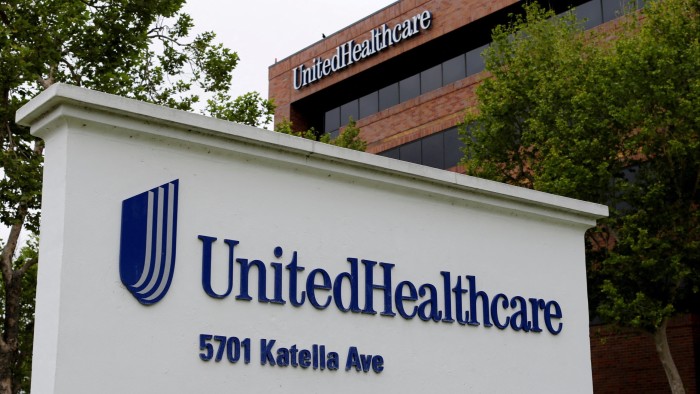Unlock the Editor’s Digest for free
Roula Khalaf, Editor of the FT, selects her favourite stories in this weekly newsletter.
US healthcare group UnitedHealth faces $1.6bn in potential settlement costs, the conglomerate said on Tuesday, amid government investigations and a corporate turnaround effort to return to earnings growth next year.
In its results for the three months ending in June, the health and insurance group reported net earnings of $3.4bn, a 19 per cent fall on the same period last year. Earnings per share were $3.74, down from $4.54 a year ago and below analyst estimates of $4.22, according to S&P.
UnitedHealth’s shares were down 7.5 per cent on Tuesday and its stock is down 48 per cent this year.
Tuesday’s earnings marked the first for new chief executive Stephen Hemsley, who returned as CEO in May, replacing Andrew Witty, a former GlaxoSmithKline CEO, who stepped down as the company pulled its annual guidance, sending UnitedHealth’s stock to the lowest level in more than four years.
For years, UnitedHealth outperformed the S&P 500 index with a business model that included health insurance, primary care and pharmacy services. UnitedHealth is the biggest employer of physicians in the US.
But recently, UnitedHealth has been hurt by higher patient claims costs. The company underestimated these costs, prompting its first-quarter earnings miss and its decision to withdraw guidance in May.
On Tuesday, UnitedHealth re-established future guidance, estimating its 2025 revenue would be $445.5bn to $448bn and net earnings would be at least $14.65 per share. The company said it expected to return to earnings growth in 2026.
But UnitedHealth said its growth would be stung by $1.6bn “of potential settlement items.” The US Department of Justice is examining UnitedHealth’s large Medicare Advantage unit. Last week, UnitedHealth acknowledged it is under a DoJ criminal investigation concerning its Medicare billing programme.
Amid the government investigations, Hemsley said the company had put a pause on exploring corporate deals.
“We stopped that entire activity,” he said on a call with analysts. “We are focused on the performance of the businesses that we have and will pick up portfolio assessment somewhere down the road.”
Recommended
Jeff Jonas, a portfolio manager at Gabelli Funds, said UnitedHealth was likely to increase share buybacks to reach its earnings targets “largely because they can’t pursue more acquisitions”.
“They’re bumping up against antitrust limits and have already faced tough regulatory reviews on their most recent deals.”
To resolve the government investigations, “ultimately, they’ll settle and pay a fine, but not this year”, Jonas said. “These things move slowly, and even a resolution sometime next year might be considered fast.”

